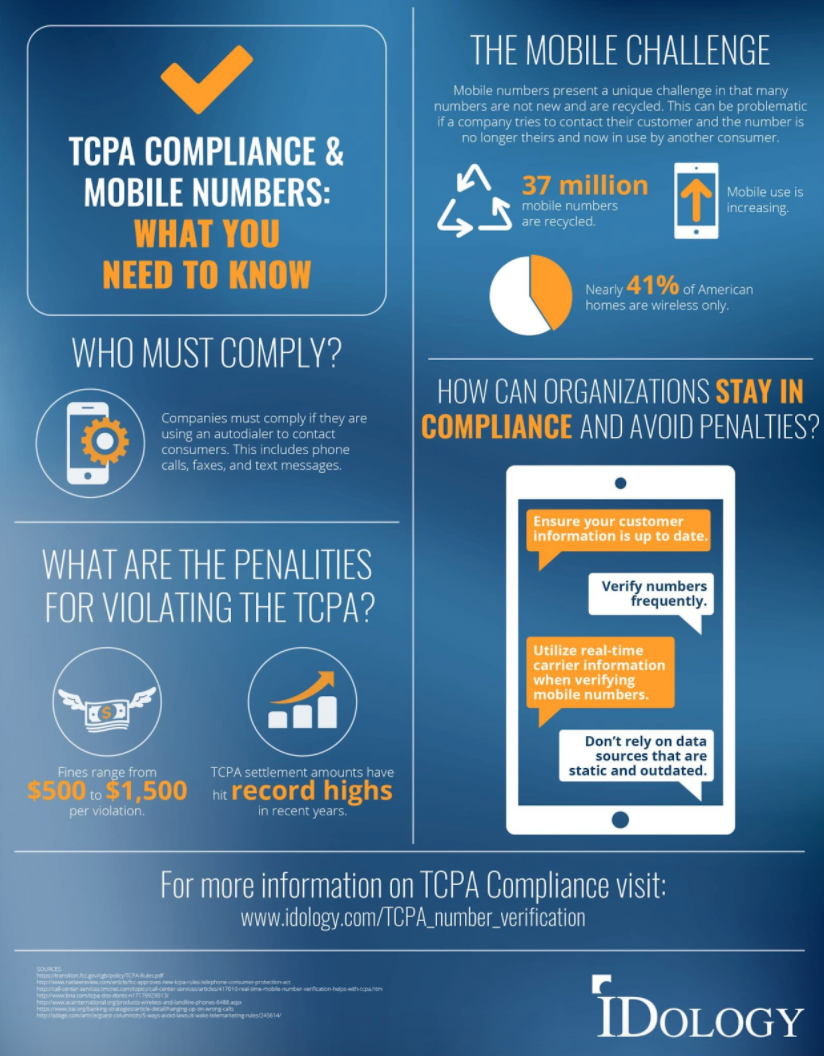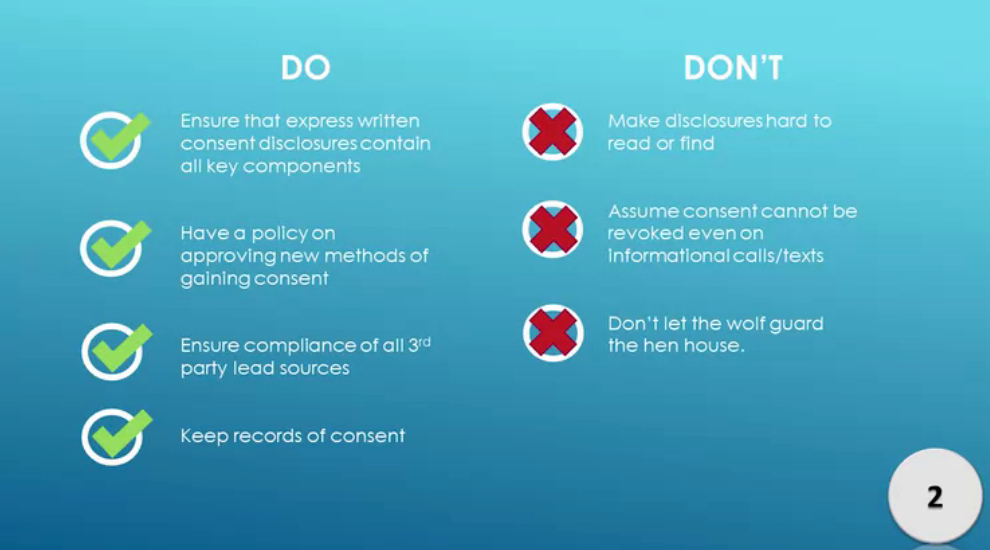Your customers are constantly inundated with unwanted messages in nearly every channel they use – from email to social media and to texting. It’s wise to take advantage of these frequently-used channels for marketing purposes, as they’ll get you in front of your customers quicker. As G2 writes, one in four internet users is a mobile-only consumer. That means that SMS marketing is one of the quickest ways to reach customers.
But in order to create the most effective SMS marketing message campaigns, you need to make sure every message you send is compliant with rules and regulations in your country. Following the Telephone Consumer Protection Act (TCPA) of 1991 will help to ensure you’re completely compliant.
This article is your complete guide for TCPA compliance for SMS marketing. We’ll cover the following sections:
What is TCPA?
The Telephone Consumer Protection Act is a set of regulations that were implemented by the Federal Communications Commission (FCC) in order to protect consumers’ privacy and reduce spammy and persistent telemarketing calls. It specifically prohibits certain types of automated calls, texts, and faxes.
As Keogh Law writes, the act was created in response to a rising number of consumer complaints about the abuses of telephone technology—for example, computerized calls dispatched to private homes. Automated devices began to be used to play pre-recorded sales pitches and they were able to dial up to 1,000 telephone numbers per hour.
The act allows for people on the receiving end of unsanctioned automated telecommunications to collect a minimum of $500 in damages. As the act was enacted 30 years ago, it is a living document. The FCC frequently updates rules in order to reflect any new technology that could be used to send illegal automated communications. Text messages are a prime example of that.
In order to remain completely compliant, you need to keep some requirements in mind when sending automated text messages. As TCN writes, here are some things you need to keep in mind:
- You may not contact anyone listed in the National Do Not Call Registry.
- Texts can only be sent between 8 a.m.- 9 p.m. in the recipients’ time zone.
- You must have prior consent to send an automated message
- Do not use autodialers to mobile phones or other recipients where the receiver pays for the call itself.
- You may not send automated messages to any number considered to be an emergency line.
If you follow TCPA compliance, you’ll see an added benefit to your business. Sending appropriate marketing messages to customers will lead to higher satisfaction. On the same note, if your team is trained in sending out the right kind of messages, your business will receive fewer complaints to the FCC. Training your team on these protocols may be tedious, but it’s absolutely worth it.
Why TCPA Matters for Text Messages

The TCPA is Changed to Include Text Messages
In 2012, the FCC made the initial move to pull text messaging under the TCPA. As Retail Dive wrote, the FCC officially took the position in 2012 that should be judged the same text messages as phone calls. That meant that text message broadcast systems were considered to be the same as an automatic telephone dialing system (ATDS). In October of 2013, the FCC officially declared text messages sent by an ATDS would officially be covered under the act.
The act went through even more changes in 2015. The newest regulation was enacted to clarify the recent changes from 2012. As Lightico writes, here are some of the new terms defined by that updated regulation:
- Telephone service providers can offer robocall blocking to consumers.
- Telemarketers may not use automated dialing to contact people without consent.
- Consumers may revoke consent to receive calls or SMS messages at any time.
- Callers must cease calling any reassigned phone numbers.
- Consent carries over when a person ports their landline phone number to a wireless number.
- Some ‘urgent circumstances’ still allow a company to call or send SMS texts to wireless phones without prior consent, such as alerts about potential fraud or reminders of urgent medication refills. But an opt-out option must still be required.
TCPA and SMS Marketing
There are plenty of items to keep in mind when staying compliant for SMS marketing, but ensuring you follow those protocols will ensure your SMS marketing campaigns are successful. Text messages are generally an untapped customer communication channel.
Text messaging has evolved from a way to send quick messages to a meaningful form of communication. It’s even many people’s main source of communication. As Lightico goes onto state, 98% of all texts are opened, and 90% of those open texts are read within the first three minutes of receiving them. People value the convenience of text messages.
People value the convenience of text messages and how direct the communications are. By remaining compliant, you’ll reap the full benefits of using SMS marketing, such as the following shared by Paldesk:
High open rates — The vast majority of all text messages are opened. So if you send one that is compliant, your customer will likely open it, getting your marketing message across.
Good conversion rates — If you send customers a text message that doesn’t feel too spammy, you’ll offer them a personalized touch. That’ll make customers more inclined to thoroughly read your messages and utilize your company’s services.
Wide and instant delivery — 71% of marketers believe mobile marketing is key for their business (Makeawebsitehub). That’s because smartphone usage has skyrocketed, and will likely continue to do so as the devices continue to evolve.
Since cell phones are everywhere, marketing messages sent via text will reach customers around the world instantly. If the text messages your organization is sending out do not comply with TCPA, you’ll be missing out on a huge opportunity.
TCPA Dos and Don’ts

Source: JD Supra
Remaining compliant means toeing a thin line. You need to keep an eye on what you should do to remain compliant and what things you should avoid, as to not acquire any kind of penalty. Here are some legal advice to consider.
How to Remain Compliant
As Snapdesk writes, you need to follow these steps to remain in line with the ordinance:
- It’s illegal to send automated text messages to current or potential subscribers without getting their permission first.
- Don’t purchase lists of phone numbers with contacts who haven’t opted in or use spammy technology like shortcodes, artificial voices, or recordings.
- Use a business messaging service that offers local 10DLC messaging.
- You must provide your business name, message frequency, and applicable messaging rates when contacts opt-in.
- Don’t send messages related to alcohol to non-age-verified numbers and overall, don’t send messages with anything that’s hateful or confidential.
Ultimately, the most important thing here is to stay on top of current regulations related to text messaging. Technology evolves rapidly, so you may fall out of compliance if you miss anything related to these rules.
TCPA Exceptions
Of course, you always need to be careful about the subject matter and the manner in which you send your text messages. But there are some TCPA text message exemptions, such as the following:
Prior relationships — If you’re texting an existing customer, you’ve already established a relationship. This is defined by a contact asking for information regarding your business within the past 3 months, or if they’ve used your services within the past 18 months.
Specific types of businesses — If a business is sent on behalf of someone covered under a certain healthcare plan or your business is a non-profit that doesn’t sell goods or services, you’re exempt from requirements.
Emergency purposes — If you’re utilizing an automated text message for an urgent emergency purpose, it’s exempt from TCPA.
TCPA Violations and Fines
Of course, if you violate regulations, you’ll be subject to fines. Here are some examples from Whitfield Bryson for what you can expect.
Unsolicited text messages — This violation is at the crux of SMS marketing. If you’re sending an automated message to a customer who did not explicitly consent to it, you’re in clear violation of regulations. Make sure you send your consumers a confirmation message about opting in via text.
Requesting additional payment — This is simply unethical. The text messages you send out should only be related to promotional or informational purposes.
Unintelligible messages — Don’t send a scrambled message — it’s a waste of your time. It’s against protocol to send a message that requires a third party descrambler to decode it.
Residential numbers — This is a loophole for the previously established relationship exception. As of 2012, you can’t take advantage of that relationship to send messages to residential phone numbers. You’ll need additional consent to contact customers via this phone number.
Customers would rather text with your organization — this has been a growing trend in recent years. Because of that, it’s vital that you know which type of text messages are compliant, and which violate the act. 76% percent of consumers already receive texts from businesses (Snapdesk), so make sure you’re sending text messages that your customers want to read.
Conclusion: A Thorough Understanding of TCPA Will Help Your Business Thrive
People are becoming increasingly reliant on their mobile devices, meaning that they’re spending more and more time in front of their screens. That makes SMS marketing the perfect avenue for quick and effective marketing.
Staying compliant just ensures you’re not taking advantage of your customers. If you’re looking to upgrade your business text messaging provider this year, take a look at our list of top providers in 2021.
This refers to messages that are necessary for the health and safety of consumers.
You need written consent for messages sent from an ATDS.
If a customer asked for information, you do not need consent to send the initial text message, as long as it pertains to the information they asked for. You also have a one-text exception to see if a phone number has been reassigned.
A good rule of thumb is to periodically remind customers of the option to opt-out and mention customer support contact options about once a month.








